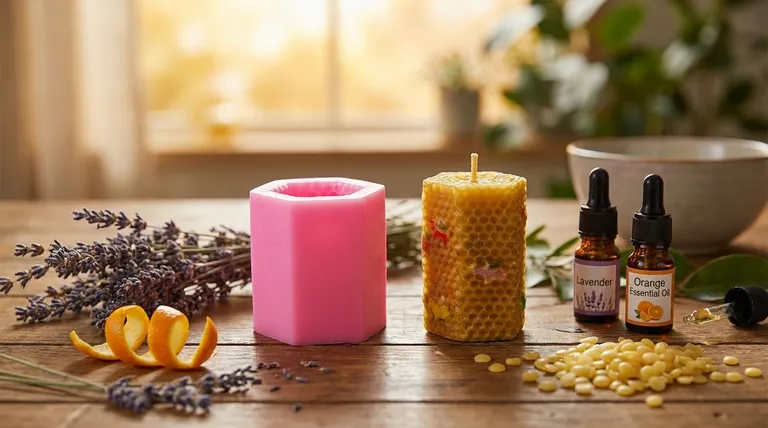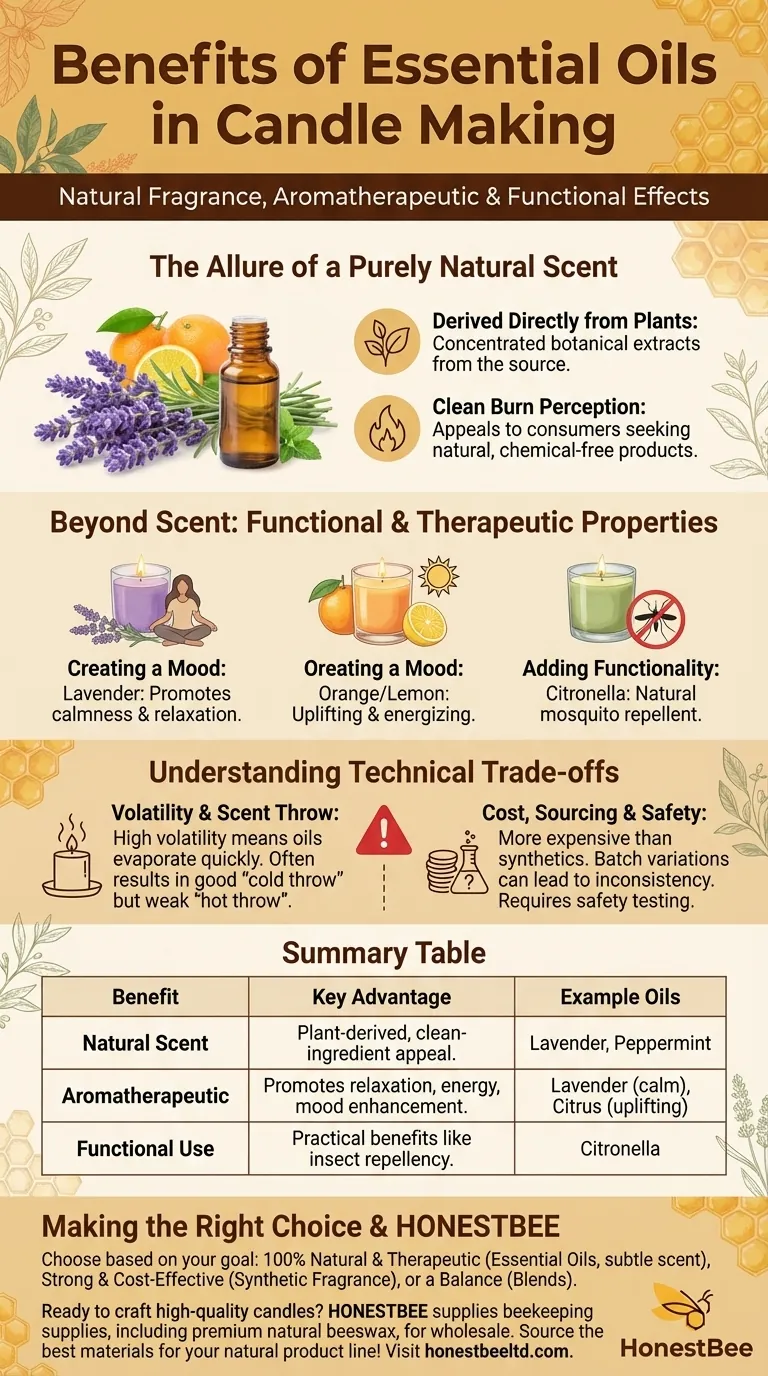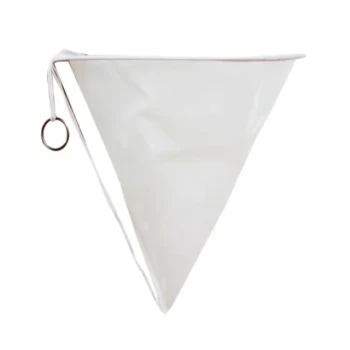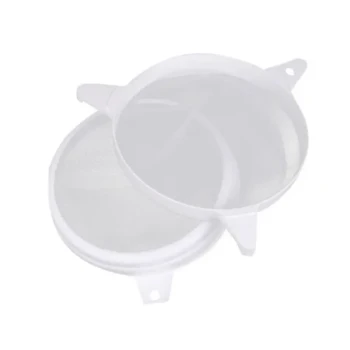The primary benefits of using essential oils in candle making are their ability to impart a completely natural fragrance and provide potential aromatherapeutic or functional effects. Unlike synthetic fragrance oils, essential oils are derived directly from plants, offering a "clean" scent profile that many consumers seek for its perceived purity and wellness benefits.
While essential oils provide an unparalleled natural aroma and therapeutic potential, they present significant technical challenges in candle making, primarily related to scent strength, stability, and cost.

The Allure of a Purely Natural Scent
The most significant draw of using essential oils is their origin. For creators and consumers focused on all-natural products, they are the only viable option.
Derived Directly from Plants
Essential oils are concentrated botanical extracts. This means the scent of a lavender essential oil candle comes directly from the lavender plant itself, not a laboratory synthesis.
"Clean Burn" Perception
Many consumers associate essential oils with a "cleaner" or "healthier" burn. While the safety of inhaling any combustion byproduct is complex, the appeal of avoiding synthetic chemicals is a powerful market driver.
Beyond Scent: Functional & Therapeutic Properties
Essential oils are not just about fragrance; they carry the properties of the plants they are derived from. This allows you to create candles with a specific purpose.
Creating a Mood
Different oils are widely associated with specific psychological effects. Lavender is renowned for promoting calmness and relaxation, while citrus oils like Orange or Lemon are seen as uplifting and energizing.
Adding Functionality
Some essential oils have practical, functional uses. A classic example is Citronella, which is a well-known natural mosquito repellent, making it ideal for outdoor candles.
Understanding the Technical Trade-offs
While the benefits are clear, the decision to use essential oils is not straightforward. Their natural chemistry creates significant hurdles for the candle maker.
Volatility and Scent Throw
Essential oils are highly volatile, meaning they evaporate easily. When exposed to the heat of melted wax and a flame, many of the delicate aromatic compounds can burn off before they can be released into the air.
This often results in a candle with a pleasant "cold throw" (the smell when unlit) but a weak or nonexistent "hot throw" (the smell when lit). Achieving a strong scent requires careful testing and often very high concentrations.
Cost and Sourcing
Pure, high-quality essential oils are significantly more expensive than synthetic fragrance oils. Creating a strongly scented candle may require a large volume of oil, dramatically increasing the cost of the final product.
Safety and Consistency
Not all essential oils are safe to burn or heat. Furthermore, as natural products, their chemical composition can vary from batch to batch depending on the harvest, potentially leading to inconsistent scent profiles in your finished candles.
Making the Right Choice for Your Goal
The choice between essential oils and other fragrance options depends entirely on your end goal.
- If your primary focus is a 100% natural, therapeutic, or high-end spa product: Use essential oils, but be prepared for a subtler scent and educate your customer on the delicate nature of the fragrance.
- If your primary focus is a strong, reliable, and cost-effective scent: A high-quality, phthalate-free synthetic fragrance oil is almost always the more practical and effective choice.
- If you want a balance of natural elements and performance: Consider blends that use a base of essential oils fortified with nature-identical or synthetic aroma-chemicals for stability and strength.
Ultimately, understanding the unique properties of essential oils empowers you to make an informed decision that aligns with your creative vision and performance expectations.
Summary Table:
| Benefit | Key Advantage | Example Oils |
|---|---|---|
| Natural Scent | Derived directly from plants; appeals to clean-ingredient consumers. | Lavender, Peppermint |
| Aromatherapeutic | Can promote relaxation, energy, or other mood-enhancing effects. | Lavender (calm), Citrus (uplifting) |
| Functional Use | Some oils offer practical benefits, like insect repellency. | Citronella |
Ready to craft high-quality candles? HONESTBEE supplies beekeeping supplies and equipment, including beeswax—a premium, natural base for your candle making. We support commercial apiaries and beekeeping equipment distributors with wholesale-focused operations. Let us help you source the best materials for your natural product line. Contact our team today to discuss your needs!
Visual Guide

Related Products
- Honeycomb Hexagonal Pillar Silicone Candle Mold for Candle Making
- 3D Square Honeycomb Pillar Silicone Candle Molds for Making Beeswax Candles
- 8-Frame Electric Self-Reversing Honey Extractor Spinner for Commercial Honey Extraction Equipment
- Electric 8 Frame Honey Spinner Extractor Equipment for Beekeeping
- Professional Honey Filter with Tripod Support Stand
People Also Ask
- What are the technical benefits of using mold casting processes in candle manufacturing? Achieve Precision & Consistency
- How do you secure a silicone mold for candle making? Prevent Leaks and Achieve Perfect Candles
- What preparation steps are necessary for professional beeswax candles? Expert Guide to Mold Prep and Perfect Burning
- What pouring techniques are required to prevent surface defects in beeswax candles? Master the Perfect Finish
- Why are silicone molds preferred over tin or plastic molds for beeswax candles? Boost Efficiency & Quality


















